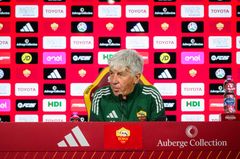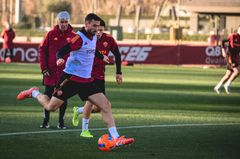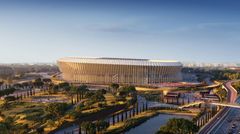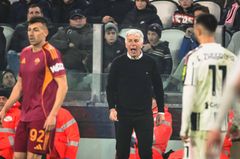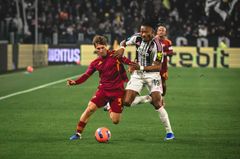
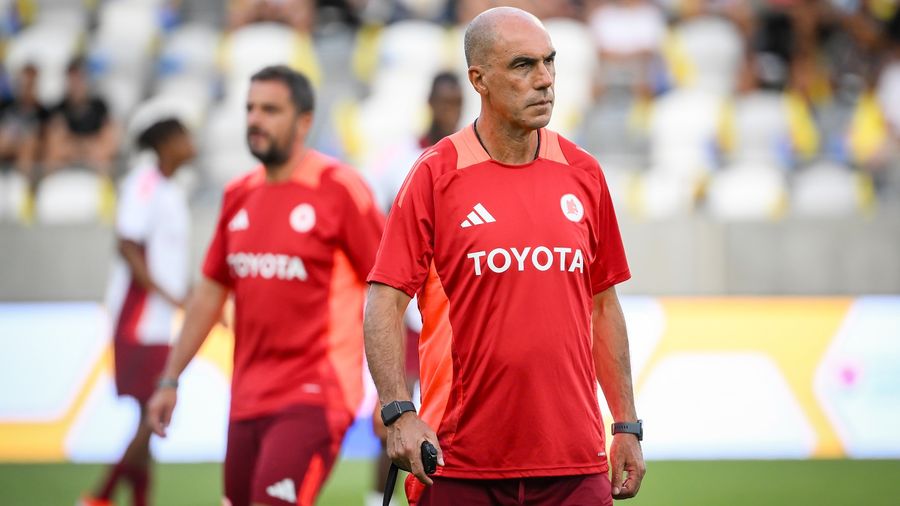
In the run-up to the new league season, the first of this series of chats is with the Giallorossi's fitness coach, Giovanni Brignardello. The 56-year-old has worked in football in a professional capacity for more than 20 years. He has worked in Serie A and the Premier League, as well as for the Italian national team.
Let's start with the first steps of your career.
"I have pretty much always worked in sport. I was a trainer for the Italian national water polo team for a few years. I lived in Genoa, where I had a physiotherapy centre used by several players of Sampdoria and Genoa, who came there for treatment.
"It was on the basis of this experience that, in 2002, Beppe Marotta – then chief executive at Sampdoria – called me up with a proposal that I join Walter Mazzarri's staff. To start with I was tasked with supporting recovery from injury and over time I became a fitness coach for football."
You mentioned water polo, probably one of the most comprehensive and physically demanding sports.
"Not comprehensive, because it takes place in a unique environment, but definitely unique and demanding."
Have you taken any principles from your experience in water polo and applied them to your work in football?
"It's a team sport, a situation sport, so from this point of view they can be compared, starting with training the group as a whole. But when it comes to other aspects, they are definitely different disciplines."
The physical side of things is becoming increasingly significant in football. In this sense, does the role of the fitness coach assume greater importance than in the past?
"I wouldn't put it that way. I think the staff play a fundamental role. It's not enough just to have the trainer working on the team's fitness.
"I'll give you an example. A football coach who understands some general principles of fitness work very well is much more of a fitness coach than the fitness coach themselves. If all tactical situations are covered in an analytical, low-intensity form, the fitness coach can work as hard as they want, but a satisfactory goal will never be achieved.
"If a coach, on the other hand, leads a session with a strong technical and tactical focus, but where real physical commitment is required, that's key to the work proving successful."
Speaking of football coaches, your relationship with coach De Rossi goes back to your experience with the Italian national team between 2016 and 2018?
"Yes, exactly. We met during that period. There has always been a relationship of mutual esteem between us. From there, the professional relationship was born."
As a footballer, what kind of athlete was Daniele?
"I got to know Daniele in the latter part of his career. Like all footballers, he evolved over the course of his career. He was a high-level athlete, who dealt with certain physical issues. He was well aware and careful about his fitness. I have always known him to be a very responsible person."
Turning to the work you are doing these days in Trigoria, what is it like to coach here?
"Coaching here is fundamental. The owners with their investments have provided the players with a truly avant-garde centre, where nothing is missing. The facility is key to both the way you work and the indirect messages you send to the players.
"I'll give you an example. If you have a very well-equipped gym, it means that gym work is important to you. If you have a recovery area with swimming pools and other first-class facilities, it means that the recovery phase is important to you. Everything is here and we are absolutely satisfied with that."
Various Serie A clubs now prefer to start the pre-season at their own training centres, rather than choosing a destination up in the mountains.
"When it comes to going up in the mountains, there is a basic misunderstanding. First of all, the altitude must meet precise requirements: it must be at least 2,000 metres. Then, you have the length of the stay. If you stay in the mountains, you temporarily have physiological effects. These are temporary, however, and will then fade, disappear.
"For us, with a campaign spread over 10 months, this is entirely insignificant. The second thing is that, going to another destination means not having all the facilities and organisation you have at a centre like Trigoria. Thirdly, the first game in Cagliari will be on 18 August. I don't think it will be a cool temperature. The choice on whether to go for a training camp is based on other principles."
Such as?
"We are going to England, but before we go, we're waiting for most of the players to join up with our squad, so we can start working on everyone. Going anywhere with eight to nine players doesn't make much sense. It makes sense to travel when the majority of the group is together."
Given that training sometimes takes place at high temperatures, how do you deal with that problem?
"You simply have to drink more. You try to cool down as soon as you can, to recover after sessions in air-conditioned rooms, with all your comforts."
So, are you debunking the myth of training camps in the mountains?
"As I said, training in the mountains makes sense when you have to prepare for competitions that take place over a certain period, in the short term. If I'm getting ready for a marathon, or an Olympic Games, it might make sense to go to the mountains. In football, the physical work is much more long-term."

 Tickets
Tickets
 Shop
Shop














